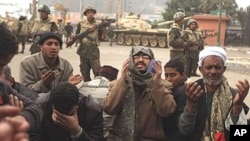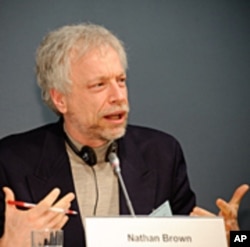As protests in Egypt continue, the Society of Muslim Brothers appears to be playing a stronger role in behind-the-scenes political negotiations. Though the Brotherhood insists it does not want to transform a post-Mubarak Egypt into an Islamic state, many do not believe the movement would be content to remain in the political sidelines.
The group has many faces, depending on who is painting its portrait. For some, the Brotherhood is a dangerous jihadist group, dedicated to the destruction of Israel. For others, it is a social service organization of devout reformists who would like to see a return of Islamic values to government, civic society and family life.
To understand the Society now, say experts, one must look back at its history.
The Muslim Brotherhood—or al-Ikhwan al-Muslimun—was founded by Hassan al-Banna in 1928 as a reaction to growing secularism under British control. Its mission was to promote return to Islamic values. The movement quickly spread to Syria, Jordan, and elsewhere in the Arab world. Later it would spawn more radical offshoots, such as Hamas and al-Jihad.
The Muslim Brotherhood was banned twice in Egypt—first, after the Arab defeat in the 1948 war with Israel, when the Brotherhood was accused of violent killings and even plotting to overthrow the monarchy; and a second time, in 1952, after the Egyptian coup that brought Gamal Abdel Nasser to power. The Brotherhood operated secretly until the 1980s, when it began to be tolerated. Though it is not allowed to run for office as a political party, members may participate in elections by running either as independents or as members of opposition parties.
“It’s worth remembering that it began as a religious awakening organization, an organization to propagate Islam—not as a religious organization,” said Robert S. Leiken, Director of the Mexico, Immigration and National Security Programs at The Nixon Center in Washington, D.C.
Leiken separates Egypt’s Muslim Brotherhood into three factions: One is what he calls a “social service organization” that performs charity work and which he says is not particularly political. “Another is very political, much smaller, but it’s interested in democratic participation, establishing Sharia law in any proximate future,” he said.
Leiken describes a third faction as pragmatists: “Sharia for most of them means something that would be desirable in the future after the society has become Islamic,” he said. “Its idea was to spread awareness and belief in Islam, and then once everybody is Islamic in that sense, then you’d have Sharia law. It would be something everybody consented to. But I think that if you ask most Muslim Brothers, ‘Is this going to happen in your lifetime?’ they would say, ‘No'.”
Nathan J. Brown is a Professor of Political Science and International Affairs at George Washington University in Washington, DC. He’s also Director of its Institute for Middle East Studies and he has written extensively about the Muslim Brotherhood. He says it is not a political party, but a reform movement, and defining Sharia is no easy business, as it is not codified and is based on traditions over a thousand years old.
“What the Brotherhood has increasingly done over the last decade or so is talk much, much less about application of Sharia and much more about using Islam as a reference point,” Brown said. “So what they seem to have arrived at is a position that says that when we in Egypt make a law, we should probably draw on that Islamically, but as long as we do not violate anything that is incontrovertibly a part of the Sharia, then that’s okay. And the number of rules that are incontrovertibly part of the Sharia is actually fairly small.”





